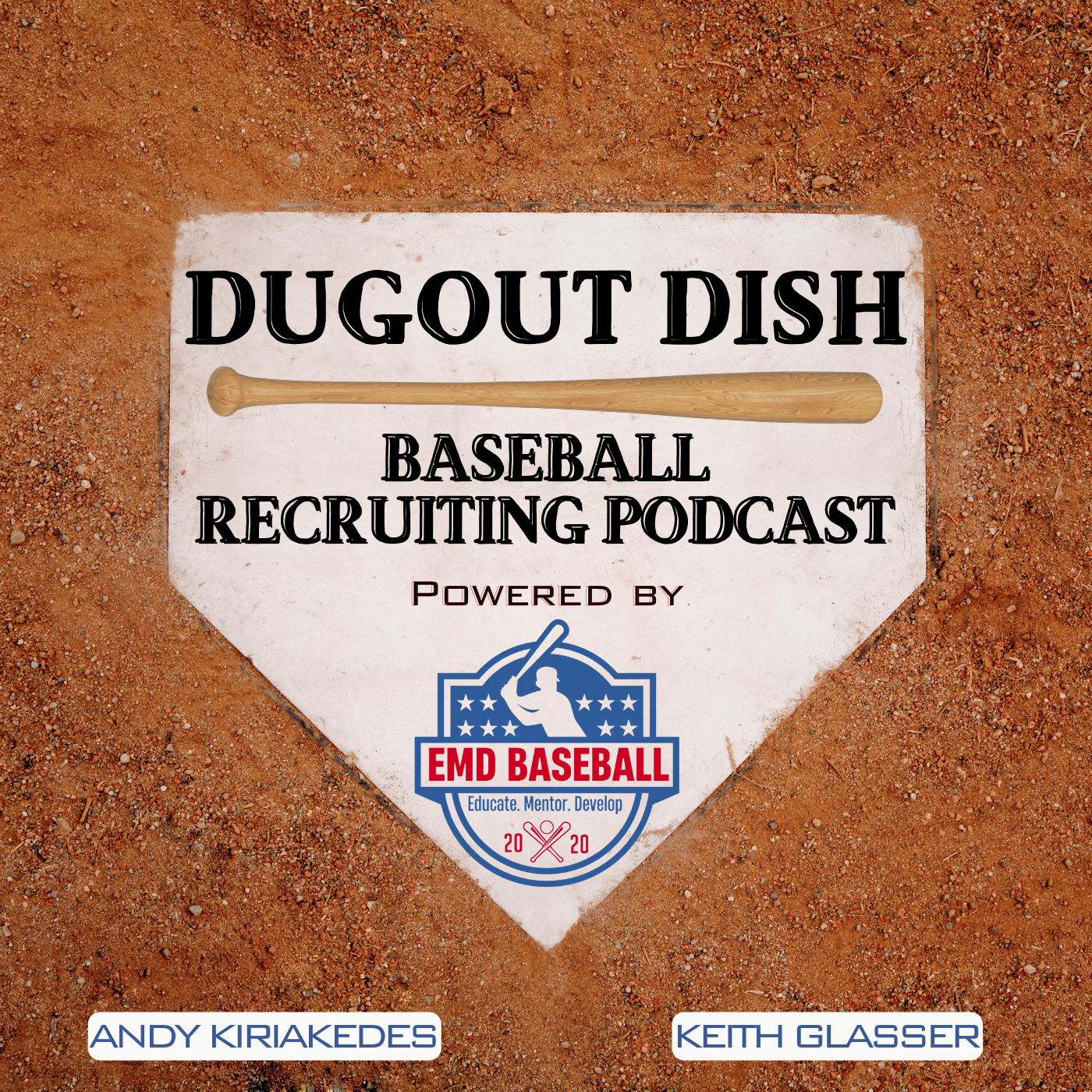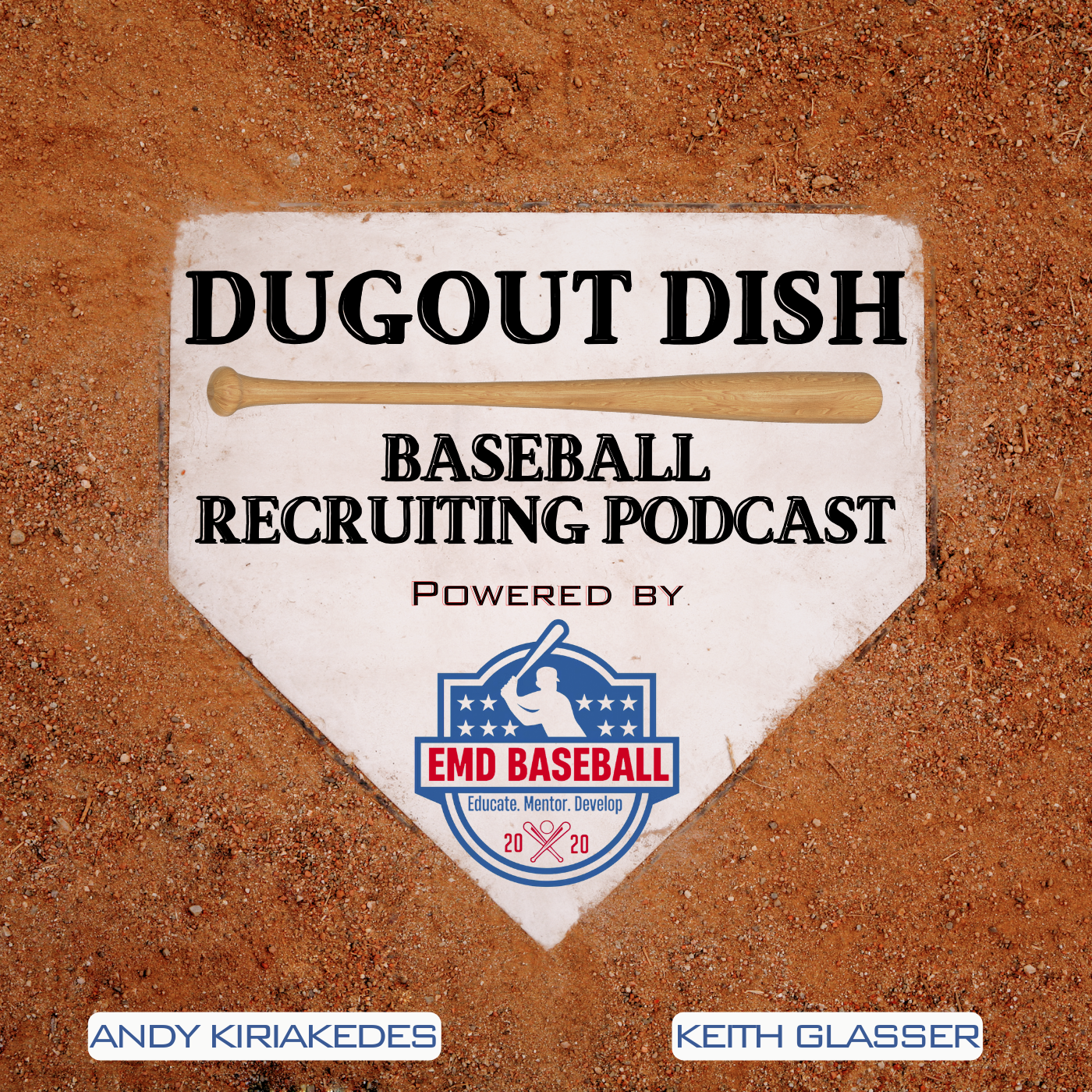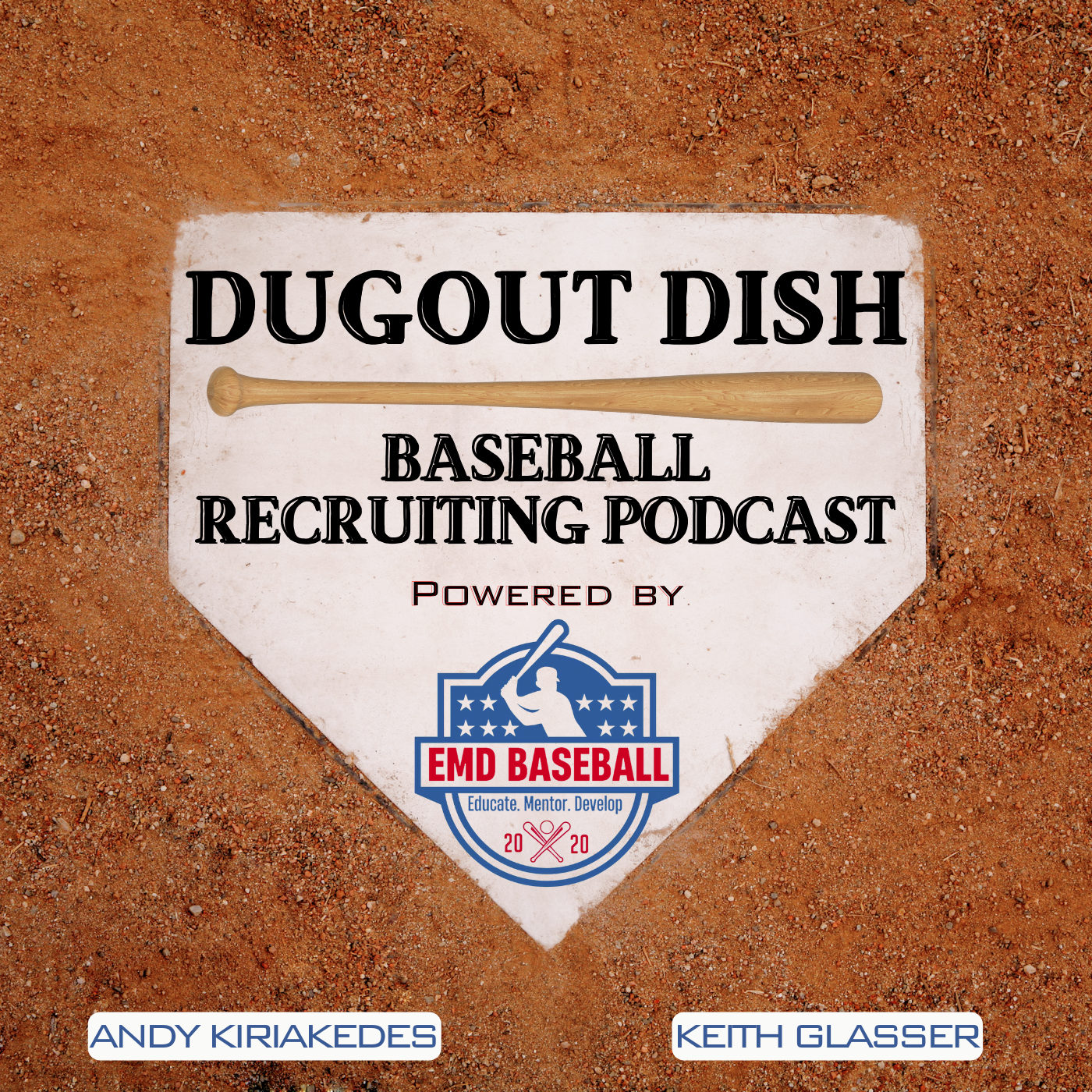Episode Transcript
[00:00:00] Speaker A: Foreign.
[00:00:11] Speaker B: Welcome to this week's edition of in the Clubhouse with EMD Baseball. I'm Andy Kirakidis, joined by my wonderful co host Keith Glasser. How we doing? Great.
[00:00:21] Speaker A: How are you?
[00:00:22] Speaker B: Good.
We're coming up on a interesting period of time for a lot of high school kids, right. You've got high school down south, I'm in Virginia. Like we're creeping up on playoffs. Season could end any day, any week now. Right. So most travel ball schedules don't start until early June, mid June.
There's this funky period right now where kids aren't going to have the opportunity to play a ton of games, but they also need to make sure that they're prepared for the upcoming summer. Right on top of that.
And I want, I'm going to kick this over to you for to touch on this particular piece, but it's a super busy time for coaches, right. And they're not always the best to get back at people.
So understanding that some of that communication might not be is good as you would want it to be.
Which will get to the topic of hurry up and hurry up and wait. But these two pieces of the puzzle need to be considered during this time period is like, what are you going to do for the next month, five weeks to make sure you stay sharp and then understanding that this is not the time to panic if there's not a ton of back and forth with coaches because it's a real funky period as a college coach getting towards the back end of your season, playoffs, you know, conference tournaments, so on and so forth.
So what do you got to say about that?
[00:01:56] Speaker A: Yeah, I think the, there's, there's an odd period that we're about to get into.
You know, most division twos and threes are getting into the last week of their conference play with obviously the conference tournaments following after that and then NCAA Regionals, super regionals, World Series, division ones. You probably have about three weeks left of conference play, maybe four, and then obviously conference tournaments, regionals, supers and the World Series, you know, so this is crunch time for a lot of college baseball programs where the, the sole focus is what's going on within the program, how can we win games, what do we need to do in order to make playoff pushes, things like that, where not the recruiting stuff stops, but it does get pushed to the back burner a little bit where you might not get a lot of back and forth with coaches because there's so much going on.
And what I mean by that, obviously from what I just said with conference Tournaments and schedules and things like that. You also have to factor in that a lot of schools are on finals week this week, next week, which throws your entire day into disarray, you know, where you're not really. You're not having team practice, but you might be having groups and guys coming out throughout the course of the day where you're literally on the field from 8 in the morning until 4 at night, because you're just trying to get everyone working, bullpens, hitting defense, the. Like, you know. And then from a gameplay standpoint, in a lot of conferences, right, especially Division 2, Division 3, and in some division ones, you don't even know what you're playing until the season ends, right? So, like, you have some, like, you're. You're. You're trying to schedule buses and hotels and travel and meals and all this stuff throughout the course of the week, because now all of a sudden you're going, you know, you had no idea where you're going, and now you're traveling. And then the next week you won. So now we're, you know, we're into the conference tournament or we're into, you know, the regionals. Like, we don't know where we're going. We'll find out from the NCAA or from the conference standpoint. And now we're going somewhere else. So now we need buses, hotels, rooms, all this stuff, like, all of that stuff in your team takes priority to what's going on. So some of that back and forth with recruits is.
Is going to fall by the wayside a little bit. So don't take it personal. If guys aren't getting back to you at the same kind of frequency that they were prior to. It's just there's a lot going on on their end. And you will appreciate when you're at a college baseball program that your coach is taking the time to make sure that he's coaching you up and being present with you versus trying to, you know, navigate 8 billion different things and recruiting all at the same time.
You know, so there's that piece. The other piece, you know, like, you touched on is there's depending on where you are in the country, right? Like, you know, I know there's, you know, we have people out of New Orleans we work with who are done with playoffs, right? So you have, you know, a substantial break between now and when the summer, quote unquote, gets underway, you know, and if you're in the Northeast, you know, it's a little bit of a shorter gap because you start later, you're going to finish up in mid May into June if you make it into the States, and then the summer starts right away. So you can kind of seamlessly transition in, or you might have two or three weeks off instead of five or six, you know, but figuring out what you need to do in that timeframe to stay sharp, you know, making sure you're on your throwing program, you're throwing your bullpens, you're a hitter, you're getting live at bats, or at least you're seeing live arms, right? Like if guys are throwing bullpen, see if you can stand in just to get live looks at pitches, you know, making sure you're practicing, making sure you're. You're staying sharp defensively. If your position guy, you're throwing so your arm stays in shape. The last thing you want to do is do all the stuff you did over the course of the off season from October, November, December, January, February, and then stop for three or four weeks and not take a.
Not take it seriously. And then all of a sudden, it's going to take you another two or three weeks to get back into playing shape because you've taken that time off where, you know, those two or three weeks where you're working yourself back into playing shape are prime opportunities for coaches to get out and see you. And if you're not, you know, if you're on your C game and not your B plus game or A game, then you know you're going to do yourself a disservice because you've taken five, six weeks off, two, three weeks, weeks off, whatever it might be. You want to make sure that you're doing everything it is in your power to make sure that you're staying sharp. Like, are you going to be in 100% game shape? Likely not. And that's okay. Coaches understand that. But there's a big difference between no seeing. You can tell the difference of, like, yeah, this kid's put in work over the last five weeks having not played, and this kid's done absolutely nothing, and he's just getting blown up, can't throw strikes and, you know, isn't. Isn't playing well, you know, so you want to make sure that you're putting yourself in the best position to be able to find that success. When your summer spins up whenever it is, and there's going to be gaps in that too, right? Like, there's not a ton of events that are going on in early June, you know, it starts to pick up in mid to late June, you know, so Even then, you want to make sure that you're, you're doing what you need to do in order to make sure that you're, you're going to find yourself having success on the field. When your summer baseball team and summer tournaments and stuff start to spin up or the camps and clinics you're going to go to be in front of coaches that you're, you're putting your best foot forward, you get to them.
[00:07:23] Speaker B: Yeah. Staying, staying primed and ready to go is, is something that you have to take ownership of, right. You can't take that month to just hang and kind of go through the motions. Like if you have a place where you go and hit, you need to be in that place four or five times a week. If you can find a pitching facility that sets up live at bats or someplace you could even just go stand in.
Huge advantage, right? So do a little bit of recon here, work here and try to find a place that you can get that stuff done. You know, taking ground balls and throwing, it's usually a little bit easier. You don't need a facility or anything like that. But like, you have to stay on top of your game. You have to stay sharp. I think the big one that guys will miss out on is that's a great time to really start to get after it in the weight room Again, a lot of guys are in the weight room a couple times a week. If they're not in the weight room a couple times a week right now, they need to be. But if you've got a five week window where you can get in the week, the, the weight room for three or four weeks and start to gain some of that strength back that you probably inevitably lost during the season.
Huge opportunity for you to get yourself right. If you're.
The one caveat to this is that if you're nursing some injuries, it's a great time to get healthy.
You know, if you got a sore arm or a sore hamstring, you still need to be doing things right.
If you, if you're a pitcher and you're a little bit banged up, but your legs feel good, you still need to be doing your leg days, you still need to be doing your running, maybe take a little bit off of the throwing, but you got to be doing stuff that's productive and doing it once or twice a week during that window, you're selling yourself short.
Right. Especially for those 26s, you've got a little bit of a sprint here. Come in the summer from June 1st to, you know, to October, you need to make sure you're doing everything in your power so that you can put your best foot forward when these coaches are going to see you in June, July, August, September.
Don't be, don't expect the summer to go great if you don't put in the effort during that window. Right. And if you're a high school kid and your team's awesome and you get to play until the end of. The end of May, awesome, you're going to stay sharper than some other guys. But if you're in a situation where you do have this gap, you have to take advantage of it.
It's that simple. Right? We've talked about this all the time. The environment right now is ultra, ultra competitive. Whether you're going to play Division 1, 2, 3, NAI JUCO, doesn't matter. It's ultra competitive. You owe it to yourself. If playing college baseball is something that you truly desire, you owe it to yourself to make sure that you're doing these things during this window. Because you got to. You have really one shot to get it right this summer. So don't look back on this window and go, oh, well, you know, maybe if I'd gone and hit a couple more times or, you know, if I'd gone in the weight room.
Don't be that guy. You know, make sure you're checking those boxes. This is your public service announcement from Keith and Andy. Take advantage of that five week window. Make sure you're being productive and put yourself in a position where you can go and show out in the summer.
[00:10:39] Speaker A: Yeah, I think you nailed it. I'm glad you brought up the. If you're a little banged up, it's a good time to recover and recoup too, because it is. But you still need to be doing something, you know, the weight room obviously get into, you know, but I just think that, you know, from an overall standpoint, the.
This is the time of year for a lot of coaches to, you know, understand that.
I guess this is the best way I can phrase this as a recruit, this is the best time. The coaches are focusing solely on their. Their 90% of their focus is on their baseball team. And they'll. They'll get to some of the things that they need to get recruiting to when they need to, because in their mind, they have five, six, seven weeks to do all of this. It's not the most pressing thing in their world right this second, right. Where as you. You feel as though like they're. No one's answering you, you don't know what's going on. What, like they're ghosting me? That's not the case. It's just in, like, from a priority standpoint, it, it's not the highest priority for them right then and there. It will be a very high priority in the very near future and it'll, it'll pick back up with intensity. So don't lose faith. It'll be okay. It's just the priority is the playoff push, what you're doing, and then ever taking care of your team, making sure all those boxes are checked. And then when I have some time, I'll get back to all these guys and it'll, it'll start to flow as it goes. So don't lose faith from that standpoint. I just want to be very clear that it's, you know, it's, this is such a crunch time from a college baseball coach standpoint that you're, you're putting a heavy emphasis on what you're doing from a team standpoint and taking care of what you need to do there. That, the recruiting stuff and getting in emails and all that stuff, like, you're really only replying to, like, you know, your boss and your kids and things like that. Like the sitting down and hammering out a bunch of recruit emails at night isn't, isn't the highest of priorities because in your mind, it's like, well, I have another, you know, five, six weeks till anything spins up. I can get back to them, get back into that swing of things. So don't lose faith. It'll be okay. They'll get back to you. It's no big deal.
You know, and on the flip side, it doesn't preclude you from continuing to keep those coaches updated with how you're doing, how your team's doing, what you got going on. Right? Like, even though they might not respond right away, like, let them know how you're doing because they'll, they're going to get back to you eventually.
[00:13:01] Speaker B: Well said.
Still got to keep those emails going out. Still got to be following people on Twitter, posting on Twitter, doing all the stuff that we talk about.
Because these guys, they can't come and see if they don't know where you're going to be.
It's just that simple. And sometimes coaches just don't respond. But they track.
Kids emailed me, oh, he's going to be on this team. I'll take a look at him. Because, you know, there are some guys who, they're not going to actively engage with the kid until they get a chance to see him play. Or, you know, they don't really waste a ton of upfront time because they want to make sure that they're going to spend their time on a kid that they're going to recruit. So a lot of times that happens when they actually get to see a play. So yeah, never panic, never does anybody good. And make sure you're getting after it. If you're one of those guys who's going to have a significant break, don't let this period go to waste.
Anything else?
[00:13:55] Speaker A: Nope.
[00:13:56] Speaker B: All right, thanks for listening, everybody. Tune in next week. Thank you.
Thank you for listening this week. If you're watching on YouTube, go ahead and hit that subscribe button and smash that like button for us. Check us out on Apple Podcasts, Google Podcasts, as well as Spotify. You can follow us on Twitter and Instagram MD Baseball. If you want to find out what me and Keith do to help families and players navigate the recruiting process, go ahead and check us out on emdbaseball.com take a few minutes to check out our new online academy. I promise you'll get some good information out of that. Thanks again for listening. Check in with you next week.


